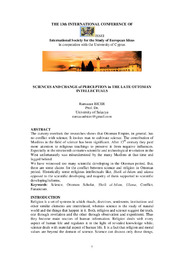| dc.contributor.author | Bicer, Ramazan | en |
| dc.contributor.editor | Papastephanou, Marianna | en |
| dc.contributor.editor | Gregoriou, Zelia | en |
| dc.contributor.editor | Koutselini, Mary | en |
| dc.contributor.editor | Zembylas, Michalinos | en |
| dc.creator | Bicer, Ramazan | en |
| dc.date.accessioned | 2013-02-27T08:22:08Z | |
| dc.date.available | 2013-02-27T08:22:08Z | |
| dc.date.issued | 2012-07 | |
| dc.identifier.uri | http://gnosis.library.ucy.ac.cy/handle/7/64940 | |
| dc.identifier.uri | http://hdl.handle.net/10797/6139 | |
| dc.description.abstract | The cursory overlook the researches shows that Ottoman Empire, in general, has no conflict with science. It invites man to cultivate science. The contribution of Muslims in the field of science has been significant. After 13th century they paid more attention to religious teachings to preserve it from negative influences. Especially in the nineteenth centuries scientific and technological revolution in the West unfortunately was misunderstood by the many Muslims at that time and lagged behind.
We have witnessed too many scientific developing in the Ottoman period. But, there are some claims for the conflict between science and religion in Ottoman period. Historically some religious intellectuals like, Sheik al-Islam and ulama opposed to the scientific developing and majority of them supported to scientific developing/reforms. | en |
| dc.language.iso | eng | en |
| dc.rights | info:eu-repo/semantics/openAccess | en |
| dc.rights | Open Access | en |
| dc.subject | Science | en |
| dc.subject | Ottoman Scholar | en |
| dc.subject | Sheik al-Islam | en |
| dc.subject | Ulama | en |
| dc.subject | Conflict | en |
| dc.subject | Fanaticism | en |
| dc.title | Sciences and change of perception in the late Ottoman intellectuals | en |
| dc.type | info:eu-repo/semantics/conferenceObject | en |
